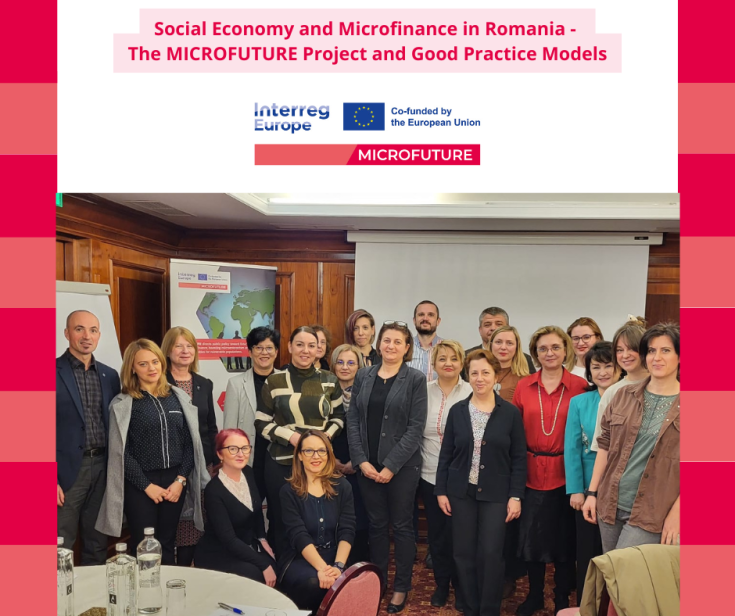Social Economy and Microfinance in Romania
The MICROFUTURE- Future proof microfinance for social inclusion project represents an important step for the development of the social economy and microfinance in Romania, with the main objective of changing public policies, promoting interregional learning and facilitating the exchange of good practices (GP). The project is coordinated by the Regional Intermediary Body for European Human Capital Programs Bucharest-Ilfov, which plays a key role as partnership leader. OIR BI contributes to the creation of a favorable framework for strengthening the social economy, facilitating cooperation between local and international actors for an impactful change in Romania.
Role of the MICROFUTURE Project in Public Policy Change
Project aims to improve access to microfinance and to contribute to the development of public policies that support the social economy. A central aspect of this project is interregional learning, which provides the opportunity to compare and adapt existing models of GP in different European regions. These exchanges of experience between project partners contribute to a better understanding of local needs and the implementation of effective solutions for the development of social enterprises.
Ashoka Romania, together with best practice models such as AFIN and ASSOC, are active stakeholders in the project, contributing to the dissemination of knowledge and the creation of an enabling environment for innovation and development. The involvement of these actors ensures an integrated approach to the challenges of the social economy, fostering the transfer of know-how and supporting local impact initiatives.
Good Practice Models from the MICROFUTURE Project
In this project, AFIN and ASSOC are presented as examples of GP that demonstrate how microfinance and the social economy can bring significant benefits to communities. These models serve as benchmarks for other regions and contribute to the interregional learning process promoted by the project.
1. AFIN - Offering Integrated Financial Support for Social Enterprises
AFIN is the first NFI in Romania exclusively dedicated to the social economy, with a clear mission to facilitate access to finance for social enterprises. Under the supervision of the National Bank of Romania, AFIN has developed an integrated model that combines financing with consultancy, thus supporting social enterprises to increase their sustainability. AFIN and the Social Finance Association (SFA) contribute to the creation of a supportive ecosystem that facilitates access to capital for social enterprises and to the resources needed for their development.
This approach has been recognized as having potential for replication at the regional level, particularly in Eastern European countries. AFIN, as a stakeholder in MICROFUTURE, contributes to the dissemination of this model and its adaptation to local particularities.
2. ASSOC - Promoting Social Inclusion through Social Economy
ASSOC stands out for its initiatives promoting the social inclusion of vulnerable groups. The ASSOC Social Restaurant model has demonstrated how social enterprises can create jobs adapted to the needs of people with disabilities and contribute to community development. Extending this model at national level, by replicating it in the counties of Maramureș, Satu Mare and Arad, demonstrates its potential to be an effective tool in combating social exclusion.
As a stakeholder in this project, ASSOC plays an important role in sharing its experience and helping other regions to implement similar practices. This GP model reflects how the social economy can become a viable solution for sustainable social inclusion.
Ashoka Romania's contribution to the Microfinance Ecosystem
Ashoka Romania, stakeholder in the MICROFUTURE project, brings its expertise in supporting social entrepreneurs and developing innovative solutions. According to the impact report published by Ashoka in 2023, one of the main challenges in this sector is the limited access to finance for social enterprises in their early stages of development.
This project is an important initiative in the field of microfinance and social economy in Romania, based on interregional collaboration and adaptation of best practice models to the local context. The active involvement of stakeholders such as AFIN, ASSOC and Ashoka Romania ensures a comprehensive and integrated approach, aimed at providing solutions to the challenges of social entrepreneurs. OIR PECU Bucharest-Ilfov, as a partnership leader, plays a key role in coordinating these efforts and creating a favorable development framework.
By sharing experiences and promoting GP, MICROFUTURE contributes to the development of a robust microfinance ecosystem capable of meeting the needs of the social economy and supporting the sustainable growth of vulnerable communities. Thus, Romania strengthens its position in promoting the social economy as a driver of inclusion and sustainable economic development.

